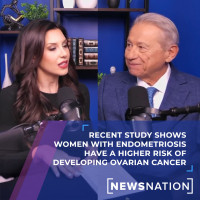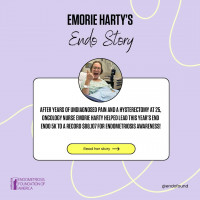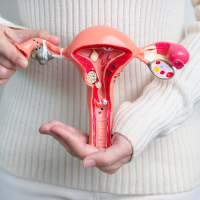Endometriosis Foundation of America 2014
Outsmarting Endo - Panel #2
- Drs. Reich, Salgado-Morales, Setúbal
Audience Member #1: Dr. Salgado, I am just wondering when endometriosis spreads to other parts of the body like the lungs, does sonography detect that? Can it be used for that?
Dr. Salgado-Morales: No. I do not have any study on that. There are other studies I could do with that for the lungs and other places but for deep infiltrating endometriosis in the pelvis, sonography, all the studies show this is the best.
Audience Member #1: I see, but for the lungs there are other ways?
Dr. Salgado-Morales: Yes, other ways. Yes.
Audience Member #2: For the management of extensive endometriosis ________ recommended ______ oophorectomy. Dr. Harry Reich is always advocating conservation of at least one ovary even in cases of very severe endometriosis. I would like to hear what he has to say regarding this. Preservation of one ovary or removal of both ovaries for very severe endometriosis during a ________.
Dr Reich: I believe that surgeons should not castrate their patients. In almost every case, like if a patient decides on hysterectomy and is in a situation where they would like hormonal function you can always save, optimize an ovary. If one is really bad you take that one and you would try to preserve the best one. If they are both bad then I tend to try to save both because I am not sure which one will recover and do the best in that situation.
Dr. Setúbal: Well, Harry I agree with you but the question is about ____ of the disease about the recurrence or whatever you mean in the future. If you have to do it at least in a patient of 30 years old and you leave both ovaries you do not have enough studies, except one, that is coming from Tommaso Falcone. I am collecting some data concerning the probability of the patient to have another surgery in the future.
Sometimes, again, as I told you at the beginning of my talk we have more questions than answers according to the radicality of the surgery. Sometimes, I would agree that we should not castrate a woman but sometimes you have to remove at least one ovary.
Dr. Reich: Well, the basic thought here is, or the debate should be whether endometriosis recurs and I heard you mention it recurs and most people think it recurs. I believe it persists and what we call recurrence is what the surgeon missed the first time out and it should be a minimal amount. It should be a rare situation where someone has to have more than two procedures. That is my belief.
Lone Hummelshøj: Can I just ask that when you ask a question you introduce yourself? We have a question here.
Dr. Reich: Let me say that if someone has - most of the time when we operate on patients with endometriosis we should have a very good idea of what is going to help the patient. By that I mean most doctors, or many doctors, do not do rectal examinations. Rectovaginal exam is the keynote for being able to delineate where the patient hurts, and if you map out where the patient hurts with a good exam, better than MRI, better than all these other things that are ordered you should be able to remove that area. You can feel it. You should be able to tell where the patient hurts.
Dr. Salgado-Morales: Yes, but the thing that not everybody is a surgeon like you or like Arnie or like Tamer Seckin and my experience with my residents that are coming up is that they need the other tools. There are some _______ coming up I could do the surgery with just doing the exam and doing that they could reach to that nodule. But 80 percent of the others cannot do it so that is why we need to develop new tools for the patient. At the end of road it is the patient that is important. We have to work for the patients. I wish we could clone you. I wish we could clone Tamer and have more surgeons like you but it is not the reality. We have to teach our residents and our students that there are more tools for imaging.
Dr. Setúbal: Just a brief comment about the diagnostic of deep endometriosis. I have to quote a professor in Clermont Ferrand, Michel Canis who says, and I agree that, "the diagnosis of deep endometriosis is done with two ears and one finger". You do not need diagnostic laparoscopy for that.
Dr. Salgado-Morales: Not a diagnostic laparoscopy.
Audience Member #3: I am Libby and I come from the Netherlands. I am struggling to understand the rationale for hysterectomy for the treatment of ectopic disease and I think that needs to be - surely there has to be a differentiation between uterine and non-uterine pain. And also, the question of presacral neurectomy, should that precede the decision to remove someone's uterus?
Dr. Setúbal: Are you talking about only pain? ______hysterectomy versus presacral neurectomy?
Libby: Yes, I am talking about the rationale for, I am talking about pain, I am not talking about fertility. I am talking about the rationale for removing someone's uterus when, for example, the treatment of ectopic lesion. I just do not see how removing a uterus will make, for example, a four centimeter rectal nodule vanish or resolve or something.
Dr. Reich: Simply put it will not. But again, I believe too that hysterectomy is usually, should be, a patient choice procedure. Very frequently it is like everything else failed and then hysterectomy is considered or the doctor presents that. But in many cases if that patient wanted to preserve her uterus or the possibility of fertility preservation she could probably find another surgeon who would remove that disease or where the patient hurts and preserve her organs.
Audience Member #4: You said that it was not a reality that most surgeons have the skills to handle the patients in this room. To make that a reality can you get, can you leave, I do not know, since you have the expertise how do we take laparoscopic rights away from surgeons that are doing the bad surgeries because they are just under-trained?
Dr. Salgado-Morales: That is a great question.
Audience Member: I think that it can be done, I mean that is why we have the conference, right? I do not want it to be just like ‘oh, it's just the reality'. Since we all have an average of multiple doctors with bad surgeries - in my case made my infertility worse - but I did not know. You did not know, like Dr. Braverman said a lot of the stuff is now new information so okay, fine, maybe she did not have the information then. But moving forward can we take those rights away from them? Can we change the protocols that they, GYNs and especially reproductive endocrinologists have to refer us to people with your expertise?
Dr. Salgado-Morales: I know in Australia they did that. _______ they have an evaluation of each gynecologist and they give stages from one to six and the level that you have passed is the only thing you are allowed in your hospital to do. I know in Denmark, Lone 12 years ago?
Lone Hummelshøj: Twelve years ago.
Dr. Salgado-Morales: They did that there. So, it is a matter to get some societies united and try to do that here in the US. But yes, you are completely right. I see that every day in my office. I have had a patient that had 14 laparoscopies and she had a nodule of three centimeters. Five centimeters from the _______. I went there, I removed the nodule, there was a colorectal surgeon, we did everything and she is fine. No problem, but 14 laparoscopies before. You are totally right. We have to work on that but it is very difficult. It is not easy to do that.
Dr. Reich: That is because Australia is an advanced country.
Dr. Salgado-Morales: Yes, as well as Denmark.
Dr. Setúbal: Yes, but probably the other way to answer your question is - there are only a few - we are the surgeons engaged in deep endometriosis surgery. We are just a small family as Lilo said before. It is very difficult for some of our colleagues to do only diagnostic laparoscopy and then look and say "this is not for me" and refer to somebody else. That is why we have those dramatic cases of people having ten or more than 12 laparoscopies before they come to us. This is my experience.
I used to say that most of my patients are second hand or third hand operated patients because I had to perform a new operation even in those that were operated on by laparotomy before with bad surgery.
Dr. Reich: Let me make one comment about this, and that is that the problem is that most people who do surgery are reasonable surgeons. They could probably do very difficult cases but with endometriosis it is a time situation. Very frequently if you are willing to spend three or four hours you could remove most of the disease but most surgeons would go bankrupt I guess if they had to do that because the insurance companies still, to this day, have one billing code, which could cover a 15 minute operation or a four to six hour operation. So it is time. If you put the time in most of the time you could remove the disease. And people are not willing enough to put the time in to get to that level.
Dr. Salgado-Morales: For a six hour surgery I get paid $400.00. But I do it because I do it for the patient. I do not care.
Audience Member: I just wanted to make a comment on your question. There are a lot of groups on Facebook and they have patient lists on what the surgeon's specialties are in the United States. There is a quote from one of those groups that there are over 56,000 gynecologists in the United States and only 100 do proper excision surgery for endometriosis. I just wanted to let you know the quote has been going around and there are lists. I can get you the name of those groups if you would like them.
Lone Hummelshøj: I am going to put a disclaimer to that comment I am afraid. Because who decides who the specialists are? I do not think a Facebook group can make that decision. I think that is something that has to come out of the professional organizations to which the physicians belong and it is not up to lobbying groups to determine who the specialists are. I would like to put a disclaimer to that, I am sorry.
Cross talk from audience members.
Audience Member: That is all there is now, that is all there is now. There is no other information so that is the problem.
Lone Hummelshøj: Right, but that is something we need to change. We need to do it properly. We need to do it properly.
Audience Member: That is what I said. We need to do it properly.
Lone Hummelshøj: We have to do it properly and I think the surgeons are aware that they need to play a role in making that happen as well.
Audience Member: Until then, Facebook it is.
Lone Hummelshøj: We have another question here.
Audience Member: Also partly with your question, we are a small voice today for the community of endometriosis but I know we will make a bigger voice as time goes on. But we cannot clone you Dr. Reich, we would love to. But I still think somehow with the AMA, FDA, whoever we have to deal with, there should be a better education for you, for other doctors and we are grateful to have all of you who are here now but all of those who are not they need...or the ones moving up into the medical field they need that education. They need an opportunity to learn this and you are pioneers to do this. They need that opportunity so there is a voice, there is a bigger voice that needs to come from there to help us.
Lone Hummelshøj: May I also just add to that please. The Endometriosis Foundation of America has a mission as well to make sure that new surgeons are trained in treating endometriosis. So it is also our opportunity to support an organization to help make that happen. And have them work with official organizations like the AAGL, ACOG, the ASRM to determine what levels of education are needed to become an endometriosis specialist if you like.
I am going to call on one person here in the audience to just make a comment and then we are going to close this debate and Padma is going to say a few words to us as well. Andrew, I wonder, you are a surgeon as well, whether you just wanted to make a comment as to what has been discussed in the last 15 minutes? Sorry to put you on the spot?
Dr. Cook: I have like how many hours?
Lone Hummelshøj: You have like 35 seconds!
Dr Cook: I think it is true as far as Dr. Reich was saying the time that it takes, the insurance reimbursements, the pressure that every GYN is qualified to do these kinds of services when we know that they are not. I think really the handwriting on the wall is that this needs to be a specialty because of the degree of training that is required to get the expertise to deal with these kinds of complex cases. It just takes time, quite a bit of time and it takes practice to keep up on it. I think that is where we really need to head is to get this as a specialty and it is going to be grassroots from ground up; whether it is Facebook or whatever vehicle that we do it in. It needs to be mobilizing our troops and letting people know the status quo is just not acceptable.
Lone Hummelshøj: Thank you, I think that is a very good note to end this discussion on. So thank you very much for your time. These physicians are going to be around for the rest of the day so there is an opportunity to nab them as well.










